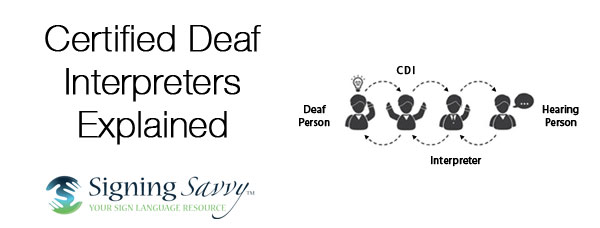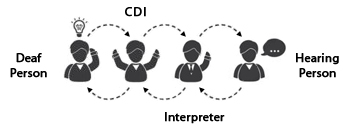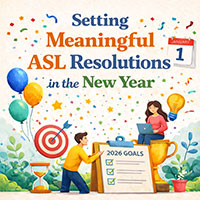
Interpreter 4-1-1: Certified Deaf Interpreters Explained
While the concept of Certified Deaf Interpreters (CDI) is not new, many people are not familiar with what they do, so misunderstandings can occur on how to utilize deaf interpreters.
What is a Certified Deaf Interpreter (CDI)?
CDI’s are deaf or hard of hearing individuals who are nationally certified by the Registry of Interpreters for the Deaf (RID). They serve as an equal member of the interpreting team along with a certified hearing interpreter. The CDI interprets the message from the deaf consumer to the hearing interpreter and the hearing interpreter then relays the message to the hearing consumer.

When to use a Certified Deaf Interpreter (CDI)?
A CDI is always a great addition to the interpreting team. Certified Deaf Interpreters have extensive knowledge and experience with deafness, the deaf community, and Deaf culture, in addition to having sign language as their native language – all of which can enhance the interpreting experience.
While a certified hearing interpreter may be adequate in many situations, CDIs are particularly useful when the communication mode used by the deaf consumer is unique, such as when they have minimal or limited communication skills or use signs that a hearing interpreter may not be familiar with (non-standard signs, "home" signs, a foreign sign language, regional signs, etc.).
It is important to remember that except for Children Of Deaf Adults (CODAs), American Sign Language is not the first language of hearing interpreters. CDI’s provide interpretation to the deaf consumer in their native language without the addition of an English accent and may also have a better understanding of what the deaf consumer is communicating.
Why to use a Certified Deaf Interpreter (CDI)?
Some hearing interpreters may be hesitant to work with a CDI. They think, "I can interpret very well so there is no need for a deaf interpreter." Others feel "demoted" or "insulted" to have a Certified Deaf Interpreter working with them because they feel it indicates their own interpreting skills are lacking. Some may even feel intimidated to have a certified deaf interpreter "watching" them.
While all these feelings are understandable, hearing interpreters would not have those feelings if they had proper training and knowledge of how to utilize a Certified Deaf Interpreter.
Reasons to support the use of a deaf/hearing interpreting team include:
- Often when a deaf consumer meets a hearing interpreter they tend to worry about their English. With a CDI present they are more relaxed and express themselves more freely.
- When the hearing interpreter hears a question and signs it to the CDI they have the opportunity to double check if the message is the same when the deaf interpreter signs the question to the deaf consumer.
- The hearing interpreter can watch the deaf consumer’s answer and then watch the deaf interpreter sign it to double-check before voicing the answer.
- The deaf consumer has the advantage of being able to double-check as the deaf interpreter relays their message to the hearing interpreter.
- If there is confusion, the CDI and hearing interpreter can work together to better understand the message and provide the best interpretation.
More deaf interpreters are now obtaining CDI certification. Including a CDI as part of the interpreting team enhances the experience for the consumers (deaf and hearing), improves the service the hearing interpreter is able to provide, and makes communicating the message more successful.
Resources:
- Registry of Interpreters of the Deaf (1997). Use of a Certified Deaf Interpreter. Retrieved 11/11/2014 from http://www.rid.org/UserFiles/File/pdfs/120.pdf
ADVERTISEMENTS
 Marta Belsky is Deaf and a third generation ASL user. She has been teaching ASL for over 35 years and enjoys sharing her native language with new users. She has a Bachelor's degree from Gallaudet University and a Masters in Deaf Education from Western Maryland College. She has taught ASL at multiple universities, coordinated interpreter services at a major university, and is a co-owner of Signing Savvy.
Marta Belsky is Deaf and a third generation ASL user. She has been teaching ASL for over 35 years and enjoys sharing her native language with new users. She has a Bachelor's degree from Gallaudet University and a Masters in Deaf Education from Western Maryland College. She has taught ASL at multiple universities, coordinated interpreter services at a major university, and is a co-owner of Signing Savvy. Incidental Information You Don't Get when You're Deaf
Incidental Information You Don't Get when You're Deaf Interpreter 4-1-1: What to Pack in Your Interpreter Bag
Interpreter 4-1-1: What to Pack in Your Interpreter Bag Living Loud: Charles "CJ" Jones – Comedian, Actor, Producer, and Director
Living Loud: Charles "CJ" Jones – Comedian, Actor, Producer, and Director






